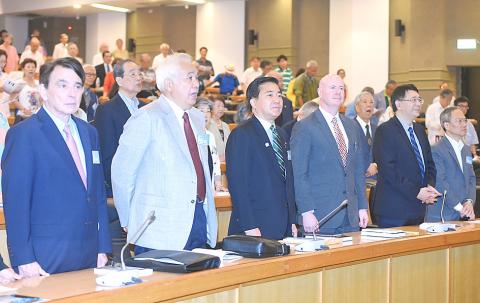As US President Donald Trump’s administration is committed to its “America first” foreign policy, Taiwan-US relations should be reoriented toward increased business ties, defense cooperation and a high-level dialogue mechanism, Idaho Republican Party chairman Stephen Yates yesterday told a forum in Taipei organized by the World Taiwanese Congress and the Taiwan Nation Alliance.
Taiwan and the US share common interests that motivate bilateral exchanges, such as economic stability, defending against Chinese and Russian cyberattacks, and freedom of navigation through disputed waters, said Yates, a former US deputy national security adviser to former US vice president Dick Cheney.
However, Taiwan-US dialogue has been limited, as the level of US officials able to engage in bilateral talks is capped, Yates said.

Photo: Liao Chen-huei, Taipei Times
“The communication has to be carried out by officials holding elected offices on both sides to be effective,” but the US has conducted the talks with non-elected officials from the US Department of State, Yates said.
The telephone call between President Tsai Ing-wen (蔡英文) and Trump in December last year might be a “one-off” that did not change the course of Taiwan-US relations, and both leaders should have a clear strategy for developing bilateral ties, he said.
Trump’s “rebalancing” emphasizes re-evaluating bilateral ties with US partners, which, in the Taiwan-US context, provides the opportunity of reframing the economic partnership, defense cooperation and non-governmental relations, he said.

Photo: Liao Chen-huei, Taipei Times
The talks between Taiwan and the US over the bilateral Trade and Investment Framework Agreement (TIFA) should be replaced with a “new communication” under Trump’s administration, which might lead to a new economic framework akin to a free-trade agreement to deepen bilateral business ties, he said.
Under the rebalancing policy, the US is encouraging its allies to build up their defense capabilities using their own means and Taiwan should evaluate its defense spending in line with the goal of developing an independent defense, Yates said.
The US government does not welcome the notion of Taiwanese self-determination, so civil-level interactions should be key for Taiwan to deepen ties with the US, he said.
“A new priority of Taiwan-US relations should be built with increased interactions between Taiwan and individual American states, rather than, but not excluding, the US federal government,” Yates said.
The Taiwanese government should seek increased international participation outside the realm of UN and its affiliated organizations, Yates said.
The UN is a “corrupt” organization, the majority of whose members are non-democratic nations and it is questionable that a formal UN membership could right the injustice done to Taiwan, he said.
The US also needs to rename the “one China” policy, a term enforced on Washington by China to rein in the US’ Taiwan policy, he said.
Former Japanese vice minister of defense Akihisa Nagashima told the forum it remains to be seen how the mercurial Trump administration affects cross-strait relations and developments in the region as a whole.
Trump flirted with the possibility of modifying the US’ “one China” policy after his telephone call with Tsai, but in a February telephone call with Chinese President Xi Jinping (習近平), he changed tack and agreed to respect it, with the apparent flip-flop indicating that Trump’s decisions are difficult to predict, Nagashima said.
It remains uncertain if Trump plans to continue to respect the Taiwan Relations Act and provide arms to Taiwan, and Taipei should speed up its efforts to build up its defensive capabilities, as the cross-strait military balance is heavily tilted in China’s favor, he said.
Japan should deepen relations with Taiwan on the security and legal levels, and the Japanese National Security Council should establish an intelligence-sharing mechanism with its Taiwanese counterpart, he added.
In addition to a free-trade pact to be established between Taiwan and Japan, “Japan should also enact a ‘Japanese version of the Taiwan Relations Act’ to elevate the level of Taiwan-Japan relations to the level of Taiwan-US relations,” he said.

The CIA has a message for Chinese government officials worried about their place in Chinese President Xi Jinping’s (習近平) government: Come work with us. The agency released two Mandarin-language videos on social media on Thursday inviting disgruntled officials to contact the CIA. The recruitment videos posted on YouTube and X racked up more than 5 million views combined in their first day. The outreach comes as CIA Director John Ratcliffe has vowed to boost the agency’s use of intelligence from human sources and its focus on China, which has recently targeted US officials with its own espionage operations. The videos are “aimed at

STEADFAST FRIEND: The bills encourage increased Taiwan-US engagement and address China’s distortion of UN Resolution 2758 to isolate Taiwan internationally The Presidential Office yesterday thanked the US House of Representatives for unanimously passing two Taiwan-related bills highlighting its solid support for Taiwan’s democracy and global participation, and for deepening bilateral relations. One of the bills, the Taiwan Assurance Implementation Act, requires the US Department of State to periodically review its guidelines for engagement with Taiwan, and report to the US Congress on the guidelines and plans to lift self-imposed limitations on US-Taiwan engagement. The other bill is the Taiwan International Solidarity Act, which clarifies that UN Resolution 2758 does not address the issue of the representation of Taiwan or its people in

US Indo-Pacific Commander Admiral Samuel Paparo on Friday expressed concern over the rate at which China is diversifying its military exercises, the Financial Times (FT) reported on Saturday. “The rates of change on the depth and breadth of their exercises is the one non-linear effect that I’ve seen in the last year that wakes me up at night or keeps me up at night,” Paparo was quoted by FT as saying while attending the annual Sedona Forum at the McCain Institute in Arizona. Paparo also expressed concern over the speed with which China was expanding its military. While the US

SHIFT: Taiwan’s better-than-expected first-quarter GDP and signs of weakness in the US have driven global capital back to emerging markets, the central bank head said The central bank yesterday blamed market speculation for the steep rise in the local currency, and urged exporters and financial institutions to stay calm and stop panic sell-offs to avoid hurting their own profitability. The nation’s top monetary policymaker said that it would step in, if necessary, to maintain order and stability in the foreign exchange market. The remarks came as the NT dollar yesterday closed up NT$0.919 to NT$30.145 against the US dollar in Taipei trading, after rising as high as NT$29.59 in intraday trading. The local currency has surged 5.85 percent against the greenback over the past two sessions, central